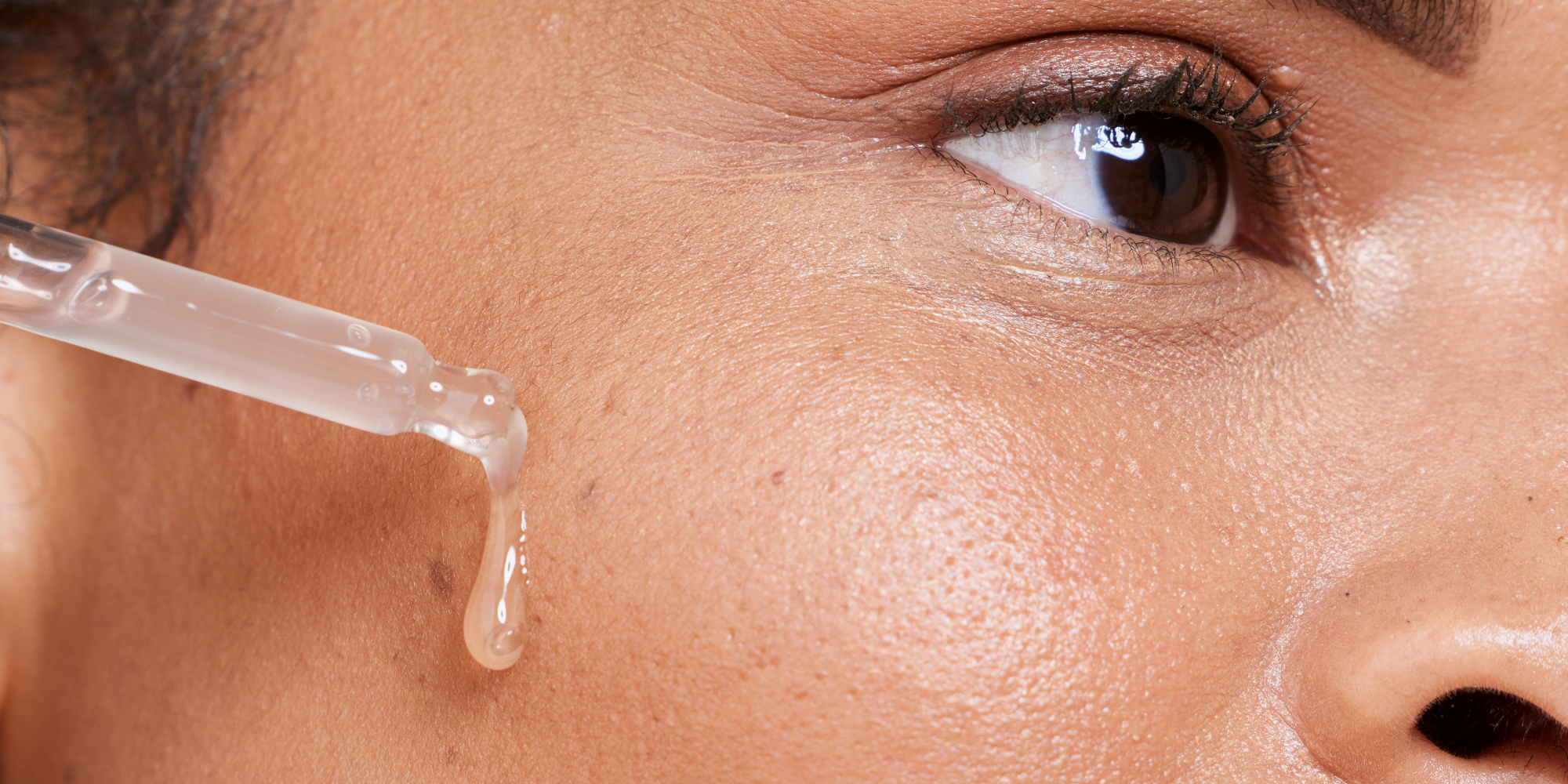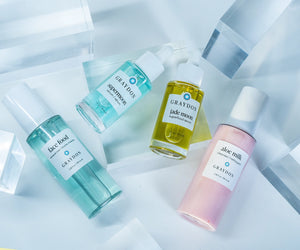For a while now, retinol has held the title of go-to ingredient for aging skin and acne. You don’t even have to be a particularly skincare-savvy person to have heard of it… that's how popular it is!
But not everyone’s skin can handle retinol, even in small percentages. It can feel like a total bummer when your skin puts its proverbial foot down and says no to such a well-loved ingredient. It feels like you're missing out on the secret to great skin. It also leaves you feeling left out of the conversation when so many products and routines people swear by end up veto-ed by your skin.
Not to mention that retinol probably leaves your skin red, flaky, irritated, and dry too.
Retinol works by increasing cell renewal—the rate at which fresh skin cells come to the surface of the skin—and by stimulating collagen and elastin production.
The reason people are raving and recommending retinol (say that 5 times fast!), is because of its ability to increase cell renewal and stimulate collagen and elastin, all of which reduces the appearance of fine lines and wrinkles, making the skin appear more youthful. Retinol—which is a vitamin A derivative—can also be used on acne, unwanted skin texture, and hyperpigmentation.

Here’s a brief list of retinol’s benefits:
- Reduces wrinkles and fine lines
- Stimulates collagen production
- Improves skin texture
- Fades hyperpigmentation
- Increases skin firmness and elasticity
- Improves acne
- Unclogs pores
- Reduces inflammation
- Reduces the appearance of enlarged pores
- Protects against free radical damage
All this to say, retinol can do a lot! But it can also leave your skin red, irritated, hot, and even flaky or peeling. Not exactly a great skin care experience…
Skin therapist Seanna Cohen shares why this irritation and flakiness can happen: “Retinization, the adjustment period your skin can go through (also called the "retinol uglies"), occurs because cellular turnover is expedited and the top layers of skin start to flake and peel. This is especially common when using higher retinol percentages or while using prescription-strength retinoids. Redness and irritation can also accompany flaking skin as the retinization process tends to disrupt the skin barrier, particularly with skin that's easily sensitized.”
But good news for those with sensitive, easily reactive skin. There are plenty of ingredients that can give you the same benefits as retinol without the irritation. Besides, retinol increases your skin’s photosensitivity—aka, your skin gets damaged by UV rays much more easily—which means you can only use it at night and need to be extra vigilant with your SPF. In fact, retinol is not recommended for daily use (you have to gradually build a tolerance to it), nor is it recommended if you’re pregnant or breastfeeding. It also weakens your skin barrier.

The gentle retinol alternatives I’m about to share are all suitable for daily use, don’t increase your skin’s photosensitivity, and are safe to use while pregnant or breastfeeding. Sounds like a win, no?
Before we dive in, Seanna shares a reminder about retinol and sensitive skin: “Just because you have sensitive skin, doesn't mean you can't use retinol. There are ways to gently use retinol, such as 'buffering' your retinol application with a layer of moisturizer, using a lower concentration, or using another derivative, such as retinyl palmitate.
Bio-retinols have become popular for sensitive skin because they do not cause the same adverse side effects and are more user friendly for newbies. Bio-retinols are not derived from vitamin A but act like retinol by activating similar pathways and stimulating cellular renewal, but do not directly bind to the same receptors as retinol, which in turn may cause flaking, redness, and irritation.”
So let’s explore some incredible gentle and sensitive skin friendly retinol alternatives, including bio-retinols. Even if you are a retinol fan, you might want to try supplementing your retinol usage with some of these. Bonus: many of these ingredients are also plant-based and natural!
Sensitive Skin Friendly Alternatives to Retinol

Bakuchiol
We’re kicking things off with what I’d consider the heavyweight champ of retinol alternatives. If you were to google “natural retinol alternatives” this would come up as the top result. Why? It’s well researched (this study found bakuchiol’s efficacy comparable to retinol) and popular amongst skincare brands wanting to offer a gentle, plant-based option that has many of the same skin benefits I listed above.

In particular, bakuchiol helps stimulate cellular activity like collagen production, giving the skin a plumper, fuller, more hydrated texture, and improving fine lines and wrinkles. It also improves skin firmness and elasticity, and brightens and evens out skin tone by regulating your skin’s melanin production.
Another plus? This powerful plant won’t leave your skin sensitized to the sun. Bakuchiol is also incredibly anti-inflammatory and antimicrobial, helping soothe redness, irritation, and even acne—it can also help with rosacea, psoriasis, and eczema.
There’s thousands of years of use to prove just how effective bakuchiol is as a skin soother: it comes from the Bakuchi/Babchi herb, which has a long history of use in Ayurvedic healing.
Bakuchiol is an antioxidant too, so you’re also getting all the protective benefits an antioxidant offers—damage defence so your skin’s cells, barrier, and collagen and elastin fibres are protected.
Find bakuchiol in Phyto Clear and Supermoon Serum.
P.S. Bakuchiol is best known as a bio-retinol, but because of its skin firming, smoothing, and brightening benefits, it’s also a competent and natural alternative to traditional vitamin C.
Dew Bean
Dew bean (also called moth bean, but we think the former sounds a lot better!) is another bio-retinol like bakuchiol. Dew bean is able to jump start collagen production and boost cell renewal, two processes that naturally slow as we age. It also has antioxidants that protect your skin from damage that can accelerate aging.

All that to say, dew bean is pretty fab at supporting your skin as it ages (skin longevity for the win!). On top of its benefits for skin aging, dew bean is also helpful for improving acne and congested and/or enlarged pores.
It works by regulating your sebum production (making sure the skin has the right amount to remain protected and hydrated without getting too oily) and by improving cell turnover, which reduces breakouts caused by dead skin cells clogging your pores.
Just like bakuchiol, this bio-retinol is sun-safe, suitable for sensitive skin, and can be used daily, morning or night. Beat that, retinol!
Find dew bean in Phyto Clear and Supermoon Serum.
Carrot Seed Oil
Retinol is actually a vitamin A derivative. Technically speaking, many botanical ingredients with a high level of vitamin A should have retinol-like benefits. That’s not always the case, of course, but it sure is when it comes to carrot seed oil!

Carrot seed oil is not only rich in vitamin A, but also vitamins C (which brightens & smoothes skin) and E (which plumps & boosts glow). Vitamin A and C work together to boost collagen and elastin in the skin, while the carotenoids in carrot seed oil work with these vitamins to provide antioxidant protection.
But here’s what really matters… all of that amounts to firmer, smoother, brighter, better protected skin. You’ll find your fine lines and wrinkles reduced, your hyperpigmentation more even, and your skin better hydrated and resilient.
The other great thing? Carrot seed oil is another ingredient that balances sebum production, plus it’s anti-inflammatory and antibacterial, meaning it will help fight off acne-causing bacteria and soothe any acne-induced inflammation or redness. Bye bye breakouts!
Find carrot seed oil in Moon Boost Serum.
Rosehip Oil
Just like bakuchiol, rosehip is a pretty tried and true botanical retinol alternative. It's a favourite amongst many plant-curious skincare aficionados because it packs so many benefits into a single, sensitive skin-friendly oil. As someone whose skin needs soothing—I appreciate rosehip’s ability to keep my skin aging well while calming the inflammation and redness I often navigate.
Up the anti! Look for ingredients that are antioxidant, antimicrobial, and anti-inflammatory.
Like I just mentioned above, retinol is a vitamin A derivative… and rosehip is full of vitamin A! Hello collagen and elastin production! This plus the fatty acids in the oil (which moisturize the skin and support the skin barrier) equals smooth, soft, supple skin—that’s another one I dare you to say 5 times fast.

Rosehip fruit extract—the kind of rosehip oil we use in our products—also offers antioxidant protection, including vitamin C (which also gives you great brightening and hyperpigmentation evening benefits) and vitamin E (the super soothing anti-inflammation vitamin). On top of all this—yes! There’s more—rosehip also promotes wound healing, which basically means your skin is faster and better at repairing any damage it is dealt.
P.S. The linoleic acid in rosehip oil can strengthen the skin of acne-prone people, providing a better environment for the skin to heal from acne. Pretty great, right?
Find rosehip oil in Skin Stuff Face + Eye Cream.
Niacinamide
Hi hi, niacinamide! This is one of the most famous gentle skincare ingredients. One, because it truly is phenomenal for red and irritated skin. And two, because it does so much more than simply soothe the skin.

Niacinamide’s antioxidant properties means it’s phenomenal at protecting your skin against environmental factors (UV damage, pollution, etc) and oxidative stress—the thing that happens when your healthy skin cells get caught in a chain reaction of damage and degradation that slows your collagen and elastin production (which can leave your skin looking dull and your pores appearing enlarged).
Niacinamide also has wrinkle smoothing properties—not only because it can speed up collagen production like retinol, but because it also encourages keratin production, a protein integral to the structure of your skin. This creates a smoother complexion and strengthens your skin barrier.
Strong, resilient, smooth skin 💪 Sounds like a win!
Find niacinamide in Aloe Milk Cleanser. Get the most out of the niacinamide in Aloe Milk Cleanser by working it onto the skin for at least 30 seconds, then leaving it on as a mask for 2-3 minutes before washing it off (if this makes your skin tingle, just use Aloe Milk the regular way).
Azelaic Acid
Azelaic Acid’s strength as a gentle retinol dupe is that it’s a brightening exfoliator. I know, I know, that doesn’t sound like retinol at first glance, but azelaic acid offers many of the same benefits. First, it's antibacterial, helping your skin fight off acne-causing bacteria. It’s also anti-inflammatory (making it a gentle ingredient) which calms breakouts. Azelaic acid also helps regulate sebum production, making it a powerhouse for acne.

If you’re looking to use retinol for something other than acne, you’re in luck! Azelaic acid acts as a melanin inhibitor, meaning it brightens the skin and evens your skin tone. As an exfoliant, dullness and clogged pores melt away under this ingredient, leaving a refined skin texture.
Find azelaic acid in Face Foam. Get the most out of the azelaic acid in Face Foam by spending a few minutes working the cleanser into the skin using an exfoliating tool like a sponge or washcloth.
P.S. If you have rosacea, azelaic acid is an ingredient proven to help.
Sea Buckthorn
Sea buckthorn, despite its name, isn’t a marine plant. It’s a berry-producing shrub grown firmly on land. Sea buckthorn oil—the part you actually put on your face—is extracted from the berries, leaves, and seeds. What’s exciting about sea buckthorn is how chock-full of vitamins and minerals it is.

You’re getting antioxidant protection from vitamins A, C, K, and E. I’ve already gone through vitamins A, C, and E above, but vitamin K is a nice addition to the mix because it can help skin repair damage faster, brighten dark under eyes, and soothe skin. On the mineral side, sea buckthorn rocks (Get it? Rocks? Minerals?) magnesium, copper, and zinc in its makeup, three minerals with incredible protective and hydrating benefits.
But you’re probably wondering what makes sea buckthorn a gentle plant-based retinol alternative. Well, the answer is that it offers many of the same skin benefits as retinol: sebum regulation, improving fine lines and wrinkles, helping with skin tone and hyperpigmentation, reducing inflammation, and antioxidant protection.
Plus, instead of damaging the skin barrier like traditional retinol can sometimes do, sea buckthorn supports the skin structure due to the linoleic acid in the oil, a moisturizing fatty acid that’s naturally found in your epidermis!
Find sea buckthorn in Putty and Face Glow. Tip: you can use Face Glow as a primer before your makeup!
Ditch the Retinol Envy and Choose Gentle Support Instead

An age-old lesson we’ve all known since we were kids is that it’s no fun to be left out. It might not seem like much, but knowing you can’t tolerate an ingredient everyone swears is the secret to great skin can put a damper on your confidence and leave you confused about what other options are out there.
Well, it turns out there’s a ton of gentle alternatives to choose from—many from mother nature herself! You don’t have to feel left out of the retinol club anymore. If anything, you can be that person who puts your friends and family onto these incredible ingredients.
If you’re curious about our sensitive skin friendly, bio-retinol products, we recommend starting with Supermoon Serum or Phyto Clear—they both contain bakuchiol and dew bean!
If you already use retinol and accidentally overdo it, leaving your skin sensitized as a result, give something like Skin Stuff (our ceramide moisturizer for ultra sensitive skin) a try to soothe your skin.
Hope you have a good skin day… everyday! 🩵



